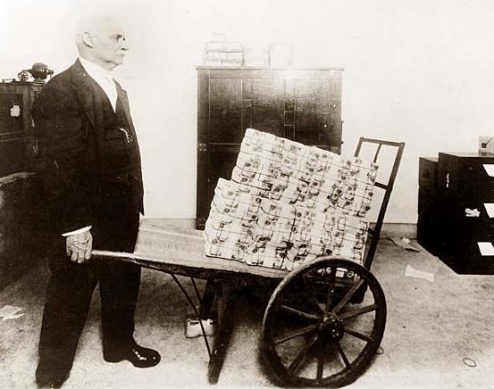American Is Bankrupt
http://www.truthdig.com/report/item/20090614_the_american_empire_is_bankrupt/
Jun 14, 2009
By Chris Hedges

This week marks the end of the dollar’s reign as the world’s reserve currency. It marks the start of a terrible period of economic and political decline in the United States. And it signals the last gasp of the American imperium. That’s over. It is not coming back. And what is to come will be very, very painful.
Barack Obama, and the criminal class on Wall Street, aided by a corporate media that continues to peddle fatuous gossip and trash talk as news while we endure the greatest economic crisis in our history, may have fooled us, but the rest of the world knows we are bankrupt. And these nations are damned if they are going to continue to prop up an inflated dollar and sustain the massive federal budget deficits, swollen to over $2 trillion, which fund America’s imperial expansion in Eurasia and our system of casino capitalism. They have us by the throat. They are about to squeeze.
There are meetings being held Monday and Tuesday in Yekaterinburg, Russia, (formerly Sverdlovsk) among Chinese President Hu Jintao, Russian President Dmitry Medvedev and other top officials of the six-nation Shanghai Cooperation Organization. The United States, which asked to attend, was denied admittance. Watch what happens there carefully. The gathering is, in the words of economist Michael Hudson, “the most important meeting of the 21st century so far.”

It is the first formal step by our major trading partners to replace the dollar as the world’s reserve currency. If they succeed, the dollar will dramatically plummet in value, the cost of imports, including oil, will skyrocket, interest rates will climb and jobs will hemorrhage at a rate that will make the last few months look like boom times. State and federal services will be reduced or shut down for lack of funds. The United States will begin to resemble the Weimar Republic or Zimbabwe. Obama, endowed by many with the qualities of a savior, will suddenly look pitiful, inept and weak. And the rage that has kindled a handful of shootings and hate crimes in the past few weeks will engulf vast segments of a disenfranchised and bewildered working and middle class. The people of this class will demand vengeance, radical change, order and moral renewal, which an array of proto-fascists, from the Christian right to the goons who disseminate hate talk on Fox News, will assure the country they will impose.
I called Hudson, who has an article in Monday’s Financial Times called “The Yekaterinburg Turning Point: De-Dollarization and the Ending of America’s Financial-Military Hegemony.” “Yekaterinburg,” Hudson writes, “may become known not only as the death place of the czars but of the American empire as well.” His article is worth reading, along with John Lanchester’s disturbing exposé of the world’s banking system, titled “It’s Finished,” which appeared in the May 28 issue of the London Review of Books.
“This means the end of the dollar,” Hudson told me. “It means China, Russia, India, Pakistan, Iran are forming an official financial and military area to get America out of Eurasia. The balance-of-payments deficit is mainly military in nature. Half of America’s discretionary spending is military. The deficit ends up in the hands of foreign banks, central banks. They don’t have any choice but to recycle the money to buy U.S. government debt. The Asian countries have been financing their own military encirclement. They have been forced to accept dollars that have no chance of being repaid. They are paying for America’s military aggression against them. They want to get rid of this.”

China, as Hudson points out, has already struck bilateral trade deals with Brazil and Malaysia to denominate their trade in China’s yuan rather than the dollar, pound or euro. Russia promises to begin trading in the ruble and local currencies. The governor of China’s central bank has openly called for the abandonment of the dollar as reserve currency, suggesting in its place the use of the International Monetary Fund’s Special Drawing Rights. What the new system will be remains unclear, but the flight from the dollar has clearly begun. The goal, in the words of the Russian president, is to build a “multipolar world order” which will break the economic and, by extension, military domination by the United States. China is frantically spending its dollar reserves to buy factories and property around the globe so it can unload its U.S. currency. This is why Aluminum Corp. of China made so many major concessions in the failed attempt to salvage its $19.5 billion alliance with the Rio Tinto mining concern in Australia. It desperately needs to shed its dollars.
“China is trying to get rid of all the dollars they can in a trash-for-resource deal,” Hudson said. “They will give the dollars to countries willing to sell off their resources since America refuses to sell any of its high-tech industries, even Unocal, to the yellow peril. It realizes these dollars are going to be worthless pretty quickly.”
The architects of this new global exchange realize that if they break the dollar they also break America’s military domination. Our military spending cannot be sustained without this cycle of heavy borrowing. The official U.S. defense budget for fiscal year 2008 is $623 billion, before we add on things like nuclear research. The next closest national military budget is China’s, at $65 billion, according to the Central Intelligence Agency.
There are three categories of the balance-of-payment deficits. America imports more than it exports. This is trade. Wall Street and American corporations buy up foreign companies. This is capital movement. The third and most important balance-of-payment deficit for the past 50 years has been Pentagon spending abroad. It is primarily military spending that has been responsible for the balance-of-payments deficit for the last five decades. Look at table five in the Balance of Payments Report, published in the Survey of Current Business quarterly, and check under military spending. There you can see the deficit.
To fund our permanent war economy, we have been flooding the world with dollars. The foreign recipients turn the dollars over to their central banks for local currency. The central banks then have a problem. If a central bank does not spend the money in the United States then the exchange rate against the dollar will go up. This will penalize exporters. This has allowed America to print money without restraint to buy imports and foreign companies, fund our military expansion and ensure that foreign nations like China continue to buy our treasury bonds. This cycle appears now to be over. Once the dollar cannot flood central banks and no one buys our treasury bonds, our empire collapses. The profligate spending on the military, some $1 trillion when everything is counted, will be unsustainable.
“We will have to finance our own military spending,” Hudson warned, “and the only way to do this will be to sharply cut back wage rates. The class war is back in business. Wall Street understands that. This is why it had Bush and Obama give it $10 trillion in a huge rip-off so it can have enough money to survive.”
The desperate effort to borrow our way out of financial collapse has promoted a level of state intervention unseen since World War II. It has also led us into uncharted territory.

“We have in effect had to declare war to get us out of the hole created by our economic system,” Lanchester wrote in the London Review of Books. “There is no model or precedent for this, and no way to argue that it’s all right really, because under such-and-such a model of capitalism ... there is no such model. It isn’t supposed to work like this, and there is no road-map for what’s happened.”
The cost of daily living, from buying food to getting medical care, will become difficult for all but a few as the dollar plunges. States and cities will see their pension funds drained and finally shut down. The government will be forced to sell off infrastructure, including roads and transport, to private corporations. We will be increasingly charged by privatized utilities—think Enron—for what was once regulated and subsidized. Commercial and private real estate will be worth less than half its current value. The negative equity that already plagues 25 percent of American homes will expand to include nearly all property owners. It will be difficult to borrow and impossible to sell real estate unless we accept massive losses. There will be block after block of empty stores and boarded-up houses. Foreclosures will be epidemic. There will be long lines at soup kitchens and many, many homeless. Our corporate-controlled media, already banal and trivial, will work overtime to anesthetize us with useless gossip, spectacles, sex, gratuitous violence, fear and tawdry junk politics. America will be composed of a large dispossessed underclass and a tiny empowered oligarchy that will run a ruthless and brutal system of neo-feudalism from secure compounds. Those who resist will be silenced, many by force. We will pay a terrible price, and we will pay this price soon, for the gross malfeasance of our power elite.

YEKATERINBURG, Russia – Brazil, Russia, India and China say the world needs a more diversified international monetary system.
The four so-called BRIC nations are concluding their first summit with a final statement calling for the reform of global financial institutions to reflect changes in world economy.
They said Tuesday there is a strong need for a stable, predictable and more diversified global monetary system and urged support for a more democratic and just "multipolar" world order.
There was no explicit mention of the U.S. dollar or the United States in the statement.
THIS IS A BREAKING NEWS UPDATE. Check back soon for further information. AP's earlier story is below.
YEKATERINBURG, Russia (AP) _ China and Russia sought greater international clout at a summit Tuesday, with China promising $10 billion in loans to Central Asian countries and Russia challenging the U.S. dollar's dominance as a global reserve currency.
Chinese leader Hu Jintao said China will offer the loans to several countries, including Russia, Kazakhstan, Kyrgyzstan, Tajikistan and Uzbekistan, to help them through the global financial crisis.
The move, announced at the meeting of the Shanghai Cooperation Organization, adds muscle to China's role in the group, which Russia and China use to counter Western influence in resource-rich, strategically placed Central Asia.
The leaders of Afghanistan, Iran, India and Pakistan were also at the table, underscoring Russia and China's reach for broader global influence. The Shanghai group members released a summit declaration saying that global "multi-polarity is irreversible," a reference to their opposition to perceived U.S. domination in international affairs.
Russia gave a prominent platform to newly re-elected Iranian President Mahmoud Ahmadinejad, a show of support for a leader facing major protests at home and questions from the West about the legitimacy of the vote count.
Russian President Dmitry Medvedev sought to further raise his country's leverage in geopolitical issues by separately meeting with Afghan and Pakistani leaders late Monday to discuss the stabilization of Afghanistan.
Medvedev said Russia offered help in carrying out joint transport, energy and other economic projects in the region to help eradicate poverty and remove feeding grounds for terrorism.
Russia signaled its intention to offer stronger assistance to the U.S.-led efforts in Afghanistan. Russia will continue to cooperate with the U.S.-led coalition there and provide transit corridors for supplies, but no new initiatives were announced.
At the same time, Medvedev pushed against U.S. domination of financial markets by calling for new global reserve currencies to complement the dollar.
"No currency system can be successful if we have financial instruments denominated in just one currency," Medvedev said. "We must strengthen the international financial system not only by making the dollar strong, but also by creating other reserve currencies."
Medvedev said new currencies will take a long time to emerge, but emphasized that the world will feel the growing need to hedge financial risks. "The main reserve currency, the dollar, has failed to serve its purpose," he said.

After wrapping up the two-day Shanghai Cooperation Organization meetings, Medvedev was to host later Tuesday the first full-fledged summit of emerging economies Brazil, Russia, India and China, collectively called BRIC.
Medvedev's economic adviser Arkady Dvorkovich said Russia may diversify its currency reserves investments by buying bonds issued by Brazil, China and India. He told a briefing that Russia could make the move if the other three BRIC members reciprocate.
Dvorkovich also proposed revising the way the International Monetary Fund's obligations are valued. He said the ruble, the yuan and gold should be part of a revised basket of currencies to form the valuation of the IMF's special drawing rights (SDRs), international reserve assets that supplement countries' existing official reserves.
Dvorkovich denied any rift on the issue with Russian Finance Minister Alexei Kudrin, who this week helped the dollar rebound in value by saying over the weekend that the dollar's status as the world's main reserve currency wasn't likely to change soon.

"No one wants to bring the dollar down," he said.
He added, however, that the creation of new reserve currencies should help distribute global wealth more fairly and also encourage economic leaders to pursue a more balanced economic policy.
The talk about global reserve currencies has been prompted by concerns in China and Russia that soaring U.S. budget deficits could spur inflation and weaken the dollar, debasing the value of their holdings.
"Those who issue reserve currencies today don't always take the interests of the global economy into account," Dvorkovich said
Officials from Russia, China and Brazil have said in recent weeks that they would invest in bonds issued by the International Monetary Fund to diversify their dollar-heavy currency reserves.
China is Washington's biggest foreign creditor, holding an estimated $1 trillion in U.S. government debt. But the Treasury Department this week said foreigners _ including China and Japan, the two biggest buyers of U.S. government debt _ had trimmed their Treasury holdings in April.
Russia's Deputy Foreign Minister Sergei Ryabkov said that the BRIC summit was "not an attempt to compete with anyone."
While BRIC members share a desire to play a bigger role in creating a new global financial order and counterbalancing the West and Japan, their often contradictory interests would make forging a common policy a difficult task.
China and India have sizable labor resources, while Russia and Brazil are rich in natural resources. China is a major consumer of natural resources, unlike Russia and Brazil, which are top producers. While China wants lower oil prices, Russia and Brazil would seek higher oil prices.
![[Dollar_Obama_ThankYouSucker.gif]](http://2.bp.blogspot.com/_nldFQlUV7Lc/SZF49fMRq2I/AAAAAAAABig/SyaJhOaBO4U/s1600/Dollar_Obama_ThankYouSucker.gif)

No comments:
Post a Comment